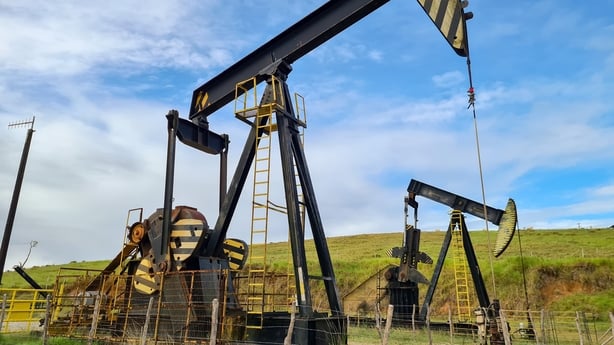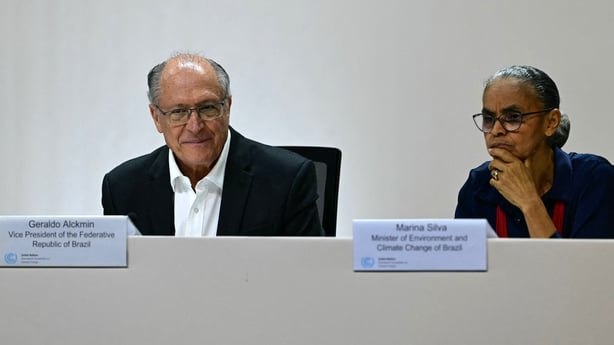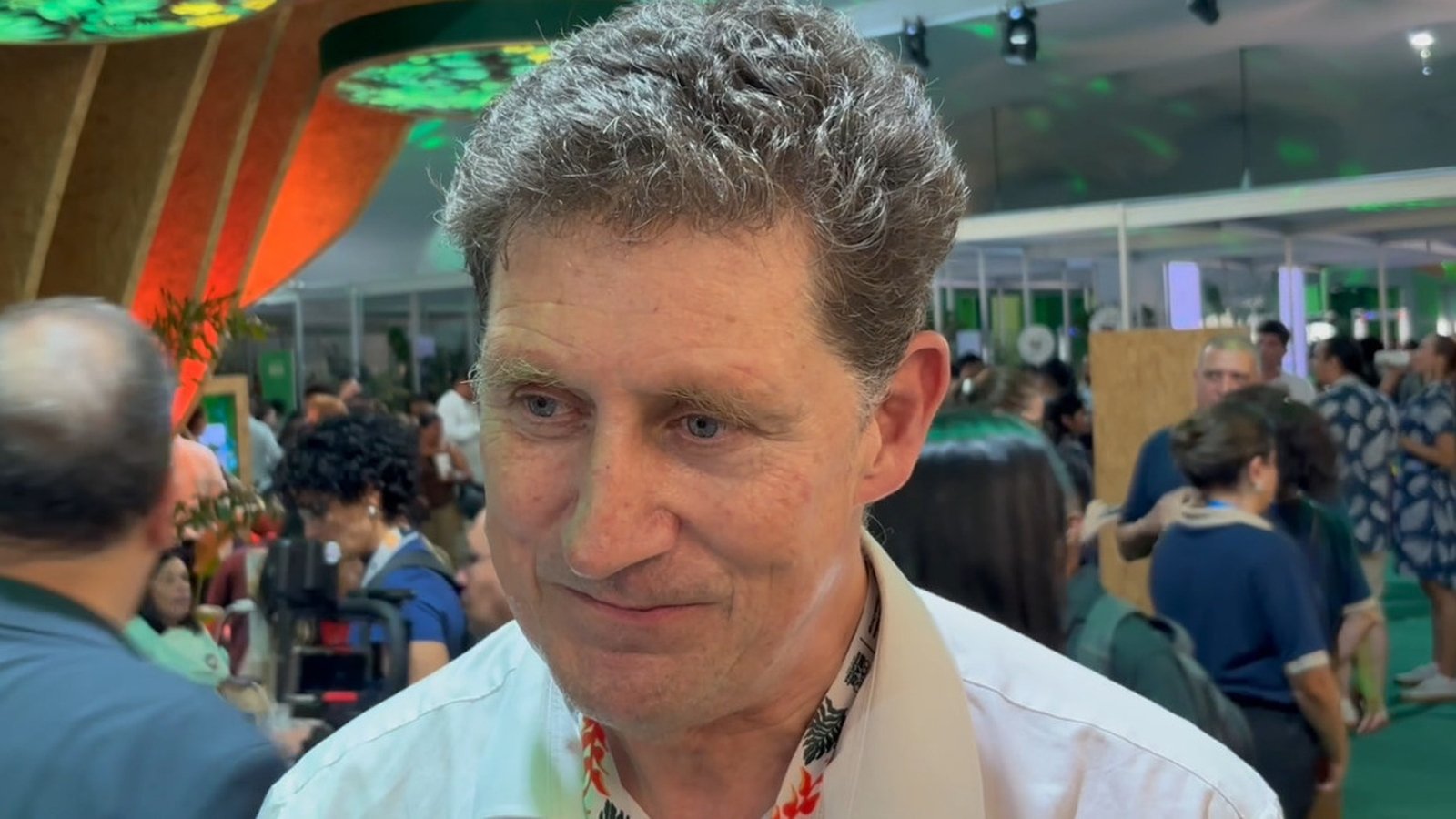Former Green Party leader and minister for the environment Eamon Ryan has said even though Ireland exceeded its carbon budget to 2025 by ten million tonnes, the average greenhouse gas per person in Ireland has halved between 2020 and 2025.
That is because emissions have fallen while at the same time the size of Ireland’s population has grown substantially.
Mr Ryan was speaking at COP30 where he now has a role working with the Climate and Clean Air Coalition.
This coalition is a voluntary international partnership of governments, intergovernmental organisations, scientific and academic institutions, and private sector actors.
The Climate and Clean Air Coalition operate under the aegis of the United Nations.
Its aim is to minimise the emissions of short-lived highly polluting greenhouse gases, with a particular focus on methane reduction, especially from oil and gas production processes.
“If you said to the average Irish person 25 years ago that they would be able to half their greenhouse gas emissions during the next 25 years most people would not have believed you.
“So I think we should be careful. We shouldn’t talk ourselves down all the time.
“Yes, of course we need to go further, and the next leap is going to be really challenging, but having done okay with our first carbon budget, that should give us confidence and inspiration for the challenge ahead,” he said.
Ireland’s carbon budget for five years to 2025 was to ensure it contributed no more than 295 million tonnes of greenhouse gas emissions to the atmosphere.
The over-run of ten million tonnes above this amount, as reported last week by the Climate Change Advisory Council, represents an overshoot of less that 3.4%.
Mr Ryan said that this is a very good outcome.
“I would say that we were close enough, and I would be proud of our role in government. We did deliver effective change, and in that first budget for 2020 to 2025 we came really close to achieving what we committed to.
“This real change in how we run our energy system, our transport system, our food system. It takes time. But I’m encouraged in the sense that we’re starting to see it work,” he added.
“We’re seeing change in the energy area, where there is a renewables revolution happening that is not going to be stopped. We are seeing it in transport, and in cities like London and Paris. They are switching away from oil and diesel. And it’s better.”
The former Green Party leader said no one can force changes that would be bad for our health, bad for our wealth, or bad for society.
However, he insisted that ways of operating cleaner and doing things better can be found.

Equipment pumping oil in a production field
“The long, slow, process of that starts here at COP30, ends up on an Irish farm, or on a Irish road, or in a solar panel being installed on somebody’s rooftop,” he said.
“If you don’t get it right here, that won’t happen in five and ten year’s time,” he added.
COP30 hosts Brazil extended negotiations into the night at the UN climate talks as they pushed for a rapid compromise among countries very much at deep odds.
Following a difficult first week, Brazil set a deadline for nations to finalise “a significant part” of the negotiations by this evening for approval the following day.
“It’s super difficult as you know… but all involved thought that it’s worth a try,” said COP30 President Andre Correa do Lago in the rainforest city of Belem where the talks are taking place.
Sleepless nights are assured, with Mr Correa do Lago extending the programme so negotiators were “able to continue working at night”.
No progress has been made to reconcile differences over weak climate commitments, insufficient financial pledges and trade measures.
China and India are leading a push for COP30 to adopt a decision against unilateral trade barriers, singling out the EU’s Carbon Border Adjustment Mechanism (CBAM) for attack.
Read the latest stories from COP30
Tested since 2023 and set to become fully operational in 2026, CBAM targets imports of carbon-intensive goods such as steel, aluminum, cement, fertilisers, electricity and hydrogen.
The head of China’s COP30 delegation, Li Gao, said last week that nations should “avoid the negative impact of, for example, geopolitical unilateralism or protectionism”.
But the EU’s climate commissioner, Wopke Hoekstra, hit back at attacks over the bloc’s flagship policy and defended carbon pricing as “something that we need”.
“We’re not going to be lured into the suggestion that actually CBAM is a unilateral trade measure. And in that realm, we’re also not going to discuss it,” Mr Hoekstra said in a news conference.
EU and Chinese officials were also due to hold talks.

Brazil’s Vice Presiden Geraldo Alckmin and Brazil’s Environment Minister Marina Silva
UN climate chief Simon Stiell urged negotiators to tackle “the hardest issues fast” to avoid going into overtime at the summit’s close on Friday.
“When these issues get pushed deep into extra time, everybody loses. We absolutely cannot afford to waste time on tactical delays or stonewalling,” he said.
The COP30 presidency published a memo on Sunday evening summarising the divergent viewpoints and proposing options.
Money is again at the heart of the negotiations, after last year’s summit in Baku ended with an agreement for developed countries to provide $300 (€259) billion annually in climate finance to poorer nations – a figure criticised as greatly insufficient.
Developing countries, especially in Africa, want COP30 to point the finger at developed nations for falling short on providing financing to help adapt to climate change and cut emissions.
Another divisive issue was a push by island states – backed by Latin American nations and the EU – for COP30 to respond to the latest projections showing the world will fail to limit warming to 1.5C.
But major emerging countries, from China to Saudi Arabia, are wary of any text that implies they are not doing enough to curb climate change.
“For Small Island Developing States, 1.5C is not a political slogan. It is a non-negotiable survival threshold for our people, our culture, and our livelihoods,” said Steven Victor, the environment minister of Palau, which is chairing the Alliance of Small Island States (AOSIS).
Fossil fight
Mr Victor told fellow ministers that AOSIS was disappointed over a lack of progress since nations agreed in 2023 at COP28 in Dubai to transition away from fossil fuels.
Host nation Brazil wants COP30 to send an ambitious signal on fossil fuels, but it remains unclear what form this might take.
Even supporters are doubtful that stronger language on fossil fuels could be agreed by all countries at COP30 given fierce opposition from major oil-producing nations, among others.
“At the end of the day… it’s about phasing out fossil fuels if we are to solve this problem,” a delegate from a European country supportive of Brazil’s fossil fuel push told AFP.
“They are not talking about it in the negotiating rooms. Someone has to do something about it.”
Brazil’s Vice President Geraldo Alckmin urged ministers to agree to “integrated action plans” for transitioning away from fossil fuels.
Mr Alckmin said President Luiz Inacio Lula da Silva might come to Belem this week, which would be “extremely positive”.
“Brazil is committed to combating climate change,” he said.
Additional reporting AFP
